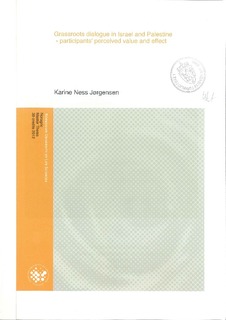| dc.description.abstract | The aim of this thesis is to investigate participants’ perceived value and effect of grassroots level dialogue facilitated between Israelis and Palestinians. The fieldwork was conducted in Israel and Palestine from October to December 2009. During the fieldwork 24 qualitative semi-structured interviews were carried out with 13 Israeli and 11 Palestinian participants. The interviewees were associated with five different dialogue groups. Each dialogue group varied in contents, structures as well as types of people associated.
This thesis argues that diplomacy and negotiations at the political level alone will fail to solve the deep-rooted Israeli and Palestinian conflict. In order to secure a sustainable peace, a bottom-up process of change must occur, which addresses the psychological barriers that contribute to deepen the division between the two sides. However, conducting grassroots dialogue in an ongoing violent conflict is challenging, especially with regards for the asymmetrical power relation between the conflicting groups, where one side is occupied (Palestine) and the other side is being the occupier (Israel). Different realities often result in different motivations and expectations of the dialogue meetings, which in turn can cause significant challenges and in worst cases make the divide even greater. For this reason several scholars argue that grassroots dialogue is not fruitful until after the occupation has ended. Thesis findings indicate that all of the interviewed participants experienced a significant personal value from dialogue. The majority expressed that dialogue have been effective in adjusting their negative stereotypes and prejudice of one another, and have contributed to the recognition of the others as human beings. Findings also indicate that dialogue helps to build a shared reality between the participants, where both peoples are included in the vision of a peaceful solution for the region. This is what reconciliation is aiming for, and one may therefore claim that reconciliation actually happens in small ways. Another finding presented in this thesis is that participants are frustrated due to dialogue’s limited impact on the political situation. Israeli and Palestinian grassroots dialogue groups have existed for many years, but the positive effect on a personal level has not yet succeeded to generalize to the macro level of the whole society. This thesis suggests several reasons for why it has not yet happened; limited ability to embrace a broader spectrum of people, as well as limited/absent cooperation between the grassroots and the political level in both societies are discussed. | no_NO |
